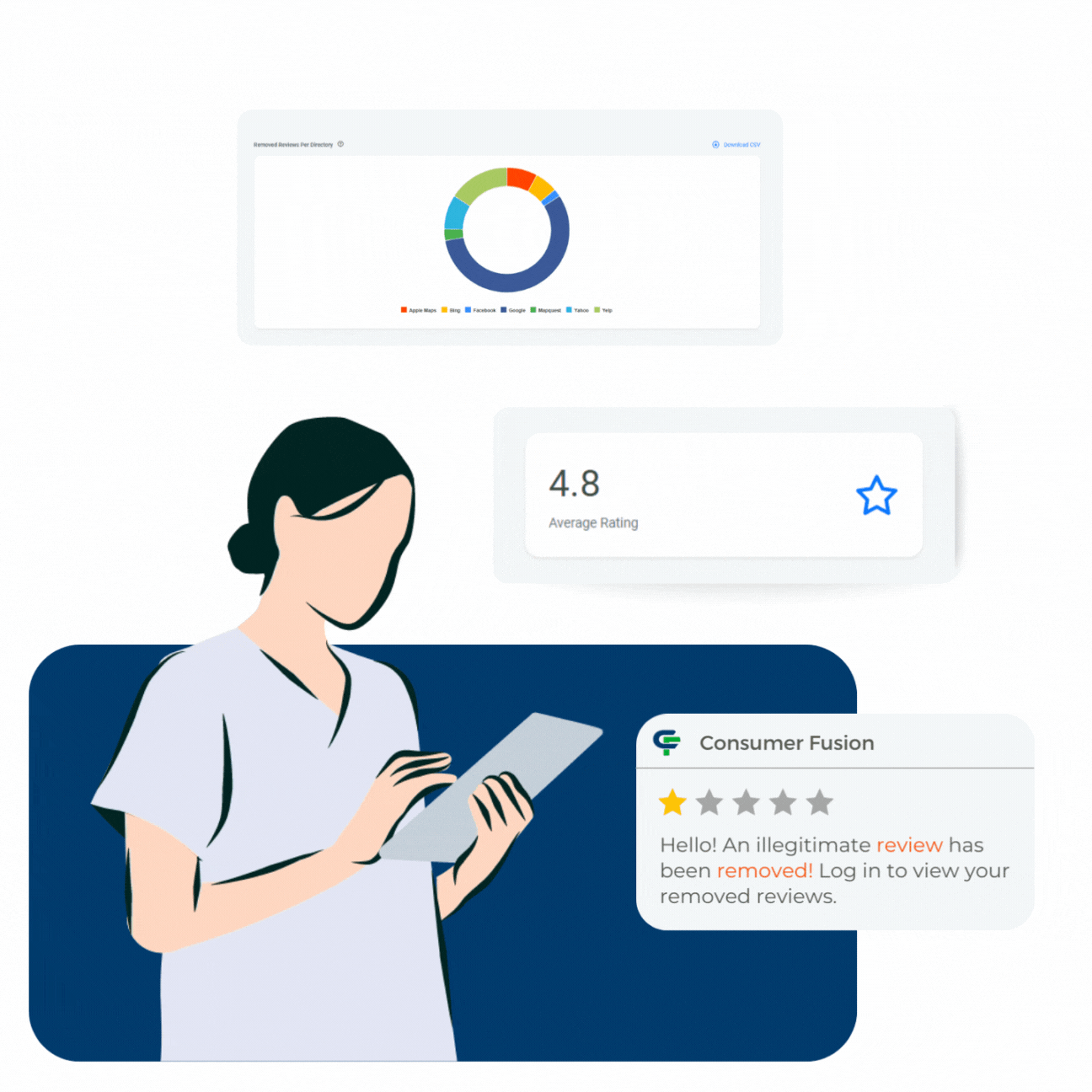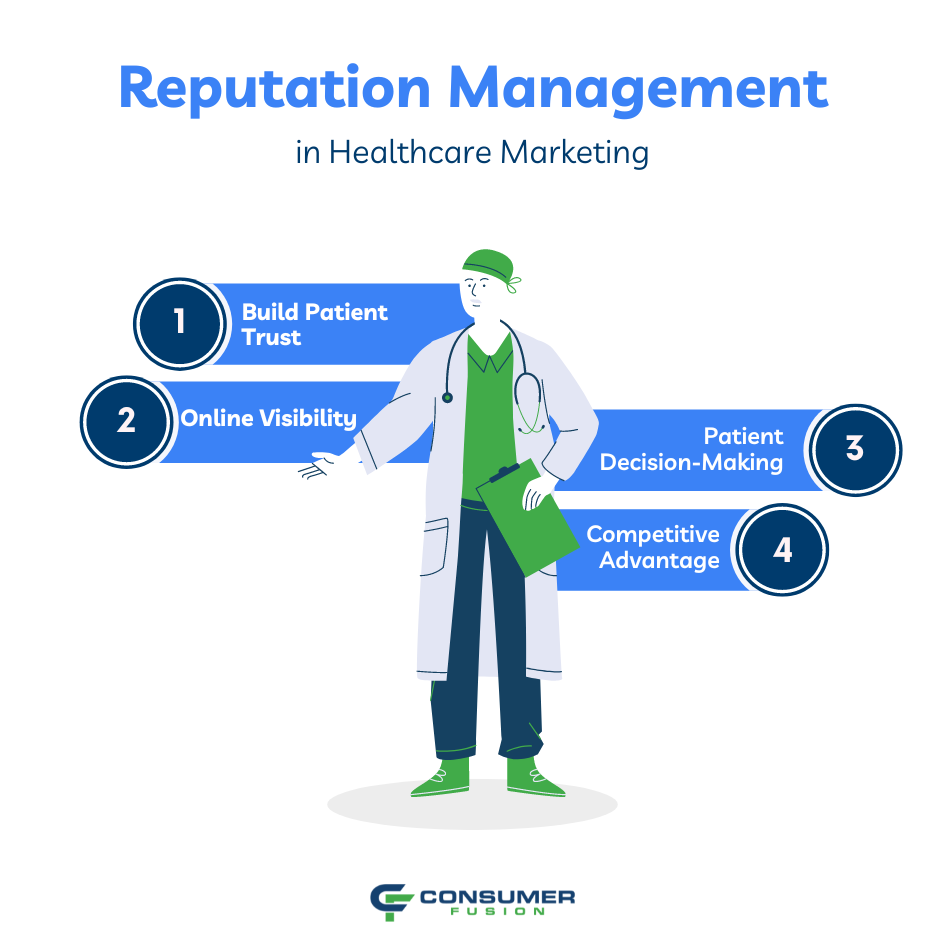As patients increasingly rely on online platforms to inform their healthcare choices, reputation management has taken center stage as a pivotal tool for your marketing success. Without a strong online reputation, your marketing efforts can easily go to waste. Patients are not only looking for healthcare services; they’re also seeking trust, credibility, and reliability. A poor or non-existent reputation strategy can jeopardize all your marketing endeavors, making it essential to integrate reputation management seamlessly into your healthcare marketing strategy. In this blog, we’ll delve into why reputation management is a game-changer in healthcare marketing and how it empowers you to excel in an era of heightened patient choice and competition.
Why Healthcare Marketing Matters More Than Ever
Before we delve into the realm of reputation management, let’s understand the unique challenges facing healthcare marketing today. The digital age has empowered patients with easy access to information, enabling them to research, compare, and choose healthcare providers with unprecedented scrutiny.
This shift in consumer behavior has transformed healthcare marketing from a one-way communication channel to a two-way dialogue. Patients are not just passive recipients of healthcare services; they’re active participants in their healthcare journey. As a result, healthcare providers need to adapt their marketing strategies to meet these changing dynamics.
Enter Healthcare Marketing and Reputation Managemen
Healthcare marketing encompasses a wide range of strategies aimed at attracting, engaging, and retaining patients. It involves online advertising, social media presence, content marketing, and more. However, one often underestimated aspect of healthcare marketing is reputation management.
What Is Reputation Management?
Reputation management is the practice of monitoring, influencing, and controlling how your healthcare facility is perceived by patients and the public. It involves actively shaping your online presence to ensure it accurately reflects the quality of care you provide. Effective reputation management extends beyond just fixing negative reviews; it’s about building and maintaining trust.

Why Reputation Management Matters in Healthcare Marketing
1. Patient Trust:
Trust is the cornerstone of the patient-provider relationship. Patients want to know that they’re in safe hands. By actively managing your online reputation, you can showcase your expertise, compassionate care, and positive patient experiences, thus bolstering patient trust.
2. Online Visibility:
A strong online presence is crucial in healthcare marketing. Positive online reviews and ratings can significantly boost your visibility in search engine results. This increased visibility can lead to more patient inquiries and appointments.
3. Patient Decision-Making:
Patients often rely on online reviews and ratings when selecting healthcare providers. A well-managed reputation can sway their decisions in your favor, helping you stand out in a crowded marketplace.
4. Competitive Advantage:
In the competitive healthcare landscape, reputation can be a key differentiator. Providers with a stellar reputation are more likely to attract patients over competitors with less favorable online profiles.
Reputation Strategy for effective Healthcare Marketing
Reputation management in healthcare involves a strategic approach to shaping, monitoring, and improving how healthcare providers are perceived by patients, the public, and the online community. Here’s what reputation management in healthcare typically looks like:
1. Online Profile Management:
Healthcare providers need to maintain accurate and up-to-date online profiles across various platforms, including their website, social media channels, and healthcare directories. This includes ensuring that contact information, location details, and services offered are correct.

2. Monitoring Patient Reviews:
Actively monitor online reviews and ratings on platforms like Google, Healthgrades, and specialized healthcare review sites. Pay attention to both positive and negative feedback.

3. Prompt Response to Patient Reviews:
Timely responses to patient reviews, especially negative ones, are crucial. You should craft thoughtful, empathetic, and professional responses that address patients’ concerns and show a commitment to improving patient experiences.

4. Patient Experience Improvement:
Reputation management goes beyond responding to reviews. You should use patient feedback to identify areas where you can improve patient experiences, whether it’s in appointment scheduling, wait times, communication, or clinical care.

5. Social Media Engagement:
Active participation on social media platforms allows healthcare providers to engage with patients, share informative content, and interact with the community. This builds trust and fosters a sense of connection.
6. Local SEO (Search Engine Optimization):
Optimizing your online content and profiles for search engines helps ensure that when patients search for healthcare services in their local area, your practice appears prominently in local search results.
In the dynamic world of healthcare marketing, reputation management is not a mere add-on; it’s a strategic imperative. Your reputation is the bridge that connects you to your patients, and it’s essential to nurture and protect it. By embracing reputation management and aligning it with best SEO practices, you can enhance patient trust, boost your online visibility, and gain a competitive edge in the ever-evolving healthcare marketing landscape.
In summary, healthcare marketing isn’t just about showcasing your services; it’s about earning and maintaining the trust of your patients. Reputation management is your compass in this journey, guiding you toward a healthier, more prosperous future.
So, are you ready to take charge of your healthcare marketing and elevate your reputation? Start today, and watch your practice thrive



















